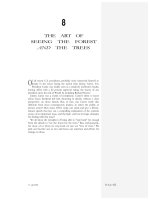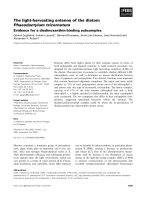James broughton seeing the light
Bạn đang xem bản rút gọn của tài liệu. Xem và tải ngay bản đầy đủ của tài liệu tại đây (760.43 KB, 81 trang )
SEEING THE LIGHT
Blank
SEEING THE LIGHT
JAMES BROUGHTON
CITY LIGHTS
@ 1977 by James Broughton
2nd printing: July 1978
Portions of this book have been printed previously in Untitled, Film
Culture, Filmmakers Newsletter and Canyon Cinemanews.
"The Brotherhood of Light" is reproduced by permission of the Friends
of Photography from their journal, Untitled, no. 7/8.
Library of Congress Cataloging in Publication Data
Broughton, James Richard, 1913 Seeing the light.
Bibliography p: 80
1. Moving-pictures-Philosophy. 2. Moving-pictures-Production
and direction. I. Title.
PN1995.B74 791.43'01 76-30681
ISBN 0-87286-090-6
/ubueditions
2009
www.ubu.com
CITY LIGHTS BOOKS are published at the City Lights Bookstore,
Broadway & Columbus, San Francisco, California 94133.
For my students, my peers, and my gods
Blank
Table of Contents
Coming into Focus………………………………………11
The Brotherhood of Light……………………………….15
Some Rules of the Game………………………………...25
Huntsman, What of the Light?..........................................33
Zen in the Art of Cinema………………………………...39
The Oz of Cinema………………………………………..51
Some Definitions…………………………………………59
The Alchemy of Cinema…………………………………61
Some Proverbs…………………………………………...69
Cinema in the Tao………………………………………..71
Seeing the Love Light……………………………………79
Filmography and Bibliography…………………………..80
PHOTOGRAPHS:
Cover
p. 9
p. 10
p. 35
p. 36
p. 37
p. 38
p. 77
p. 78
James Broughton (by Joel Singer)
James Broughton filming Testament, 1974 (by Robert A. Haller)
Dreamwood, 1972
Mother's Day, 1948
The Pleasure Garden, 1953
The Bed, 1968
The Golden Positions, 1970
Erogeny, 1976
Testament, 1974
9
10
Coming into Focus
When I was 30 my greatest consolation was the thought of suicide. But
that was three years before I began to make films. What a lot of
vicissitude, ecstasy and ennui I would have missed!
Did the creation of moving black and white images save my life? It is
certain that I have never seriously contemplated suicide since. 'It takes a
long time to become young,' said Picasso.
*
Of techniques of film there are many manuals.
Of critiques there are innumerable opinions.
Of illuminations there are only fitful flashes.
I for one could wish for more perception of the poetic view. For me
cinema is not social phenomenon or cultural question mark, it is a
potential oracle of the imagination. For me cinema is poetry and love and
religion and my duty to the Lords of Creation. I use these terms
interchangeably.
*
I am not talking here about going to the movies. I am talking about
making cinema. I am talking about the life of vision. I am talking
11
about cinema as one way of living the life of a poet. I am talking about
film as poetry, as philosophy, as metaphysics, as all else it has not yet
dared to become.
Einstein said: 'The most beautiful thing we can experience is the
mysterious. It is the source of all true art and science.'
*
Going to the movies, to indulge your fantasies or to have critical
opinions, is certainly one way to pass your time. But it has little to do
with the art of bringing the movie to life or bringing life to the movie. Be
wary: life is what happens while you are doing something else.
*
'Try, as if you were one of the first men, to say what you see and
experience and love and lose,' wrote Rilke to his questioning young poet.
Only thus will you discover what Emerson called your own peculiar
'angle to the universe.'
True poets are as anarchic as Jesus and Lao-Tzu. They particularly love
revolutions, for revolutions are symbols of freedom from the major
enemies of art: cops, critics, and collective inertia.
Every artist is in revolt. Because he is revolted by the passion for
ignorance, greed and laziness in his fellow men. He knows a livelier
realm where they might dwell, if only they could see the Light. So he
tries to show them the Light. And they can't see it. They don't want to see
it. They say, 'I don't see anything in it.' So he tries again. He lights
another lamp, he makes another revolution.
But let us keep clear what kind of revolution we are talking about.
12
Poets are not moral examples to society. Their value is in being
obstreperous, outlandish and obscene. Their business is to ignite a
revolution of insight in the soul.
*
Analytical theorizing is often felt to be 'over one's head.' It is nothing of
the sort. It is actually under one's feet. It is the mud one has to wade
through: the bog of literal minds who build labyrinthine swamps of
intellect to preserve themselves from direct experience. What is truly
over one's head is the realm of the poetic imagination. As Barnett
Newman put it: 'Aesthetics is for the artist as ornithology is for the birds.
*
So look up and look out and seek the Light that flies.
When you travel, don't follow the main roads. Get lost.
If you are too choosey about the spaces you visit, you may miss
Inspiration Point.
*
Cinema like life is only worth living when it is in the service of
something beyond the explicit and the mundane.
When Marianne Moore was asked whether she wrote poetry for fame or
for money, she replied, 'Are there no other alternatives?'
Some years ago I came upon the following sentence (author unknown to
me): 'The purpose of life is to discover what the Glory of
13
God is, and then to spend your life celebrating it.' This banal sentence
has kept me busy ever since. Such a view is not at all in fashion:
nowadays we are encouraged to view the Glory of God as a problem or a
despair. Secretly poets know better. However much they may grumble,
they are enchanted by what they discover, shape and reveal.
We may not be able to alter our births and deaths, but we can render the
interval between them more endurable. And even transcendent. 'Where
your bliss is, that is where your god dwells.' Then, as St. Augustine
advised, 'Love God, and do what you will.' In fact, do not think about
God at all, but experience being God.
*
So, let there be some light.
Do you see the Light? Do you seek the Light?
Do you have a film in front of your eyes?
Or do you have a film over your eyes?
The Light, said Paracelsus, is the star within us.
Bring forth your own light, however dimly it glows.
Besides aurora borealis and lightning there are: flashlights, hurricane
lamps, matches, birthday candles, sparklers, bonfires, and pilot lights,
I Thessalonians 5:5 says; ‘Ye are all the children of light.'
Seek, penetrate, magickize!
Radiance is the nature of the Divine.
14
The Brotherhood of Light
So, you want to make a personal film?
You want to bring your visions to life?
Warning: a visionary film is a dangerous quest.
Will you promise to make visible the invisible, express the inexpressible,
speak of the unspeakable?
Do you know how to go about it?
Do you know where it will lead you?
*
I can tell you what I know, or think I know, about the making of poetic
cinema and the poetry of making cinema. I am not an expert on anything,
but I have been a poet clad in movies since childhood and during the past
30 years I have tried to express some of my own visions on film. It's
possible that the very next work I attempt may disprove my knowledge.
Every new film begins from scratch, from a roll of blank film, as if one
knew nothing at all. Another leap in the dark, another jump off a cliff!
So I do not claim to be right about my own pronouncements. As the old
sage Lao-Tzu said, no one can be right without also being wrong.
15
Nor do I have any pretension that I am saying anything new. Wisdoms
are clichés; the best ones are great clichés. I set down my own true isms
in the form of precept and admonition for the very good reason that they
comprise what I repeatedly advise myself.
But if you are a true poet you will pay no attention to good advice. You
will make your own mistakes in your own peculiar way and so discover
your own wisdom.
*
What is a visionary?
Fellini has replied: 'For me, the only realist is the visionary because he
bears witness to his own reality.'
The Initiation: some elementary questions
Has your angel touched you on the shoulder and told you that you must
risk all?
Do you believe that you are one of those who must serve the true god of
cinema?
Are you willing to live in the dedicated service of the Great Projector?
Are you like the child who cried out on waking, 'Turn on the light! I want
to see my dreams! '?
16
Do you pray to see your own images cast before the world in a beam of
light?
*
O the white light! The radiance of the inner light!
O to be a searchlight encircling the seas!
*
Making a film is a more hazardous act than looking at one. For you will
create a dream. Whereas dreams themselves are natural events which
happen to us. You will create a dream for others to dream and to be
dreamed by.
*
Every film is a voyage into the unknown. You set out for great India and
arrive at a very small island in the Caribbean. You will need to drag your
crew through storms and famine, keep them from mutiny, keep them
from suspecting your own doubts. And sometimes, once you have
arrived, they will claim the credit and the spoils.
If you don't particularly care for Columbus, would you settle for Vasco
da Gama? Magellan? Neil Armstrong? What explorer can cross
uncharted seas without a passionate faith in his own vision: the golden
images he will discover? This is an attitude toward life, and its ship flies
the flag of the poet.
*
I have never begun a film, however well prepared, that did not prove to
have a life of its own and lead me to a region where I did not
17
expect to go. What safaris! What narrow escapes! The maps can lead
directly to quicksands and the jaws of dragons. Yet sometimes the end of
the trail may be quite near King Solomon's mine.
It is not we who play with cinema. The nature of cinema plays with us.
Your film knows better than you what form it wants to have, what
corners it wants to turn, and what its real meaning is. Let it take you
wherever it wants to go. Nietzsche's cry was: Live dangerously! Which is
the same thing as: Live poetically!
*
Well, are you ready? Are you willing to be initiated?
It's rather unwise to embark on the high seas without knowing a few of
the natural laws of navigation. To have a shipwreck before you have
cleared port is both messy and embarrassing. Let's try to get out to the
open sea before we urge anyone to Sink or Swim.
Therefore, let's begin with a little catechism.
First of all, do you believe in Light?
Do you seek the Light?
Are you entranced by the Riddle of Lumen?
Does the darkening hall give you an expectation of mysteries to be
revealed?
Does the sound of a projector and the flicker of focus leader set your
nerves into eager anticipation?
Are you willing to accept Illumination as the true faith?
18
Do you want to be enlightened?
Do you want to be enlightening?
Do you want to join the Order of the Brothers of Light, founded in 1895
by two French brothers aptly named Lumiere?
*
I speak in ecclesiastical terms, not out of frivolity, but because you
should understand the seriousness of the way of life you will have to live
once you have taken the vows.
If cinema is truly the super art of our century, its iconography unveiled
before theater congregations around the world, then it is a calling to be
embraced in responsible and solemn terms.
At one and the same time we must ask the best of ourselves and of
cinema itself.
*
For the moment, look at cinema as a mystery religion.
Going to the movies is a group ceremony. One enters the darkened place
and joins the silent congregation. Like mass, performances begin at set
times. You may come and go but you must be quiet, showing proper
respect and awe, as in the Meeting House or at Pueblo dances. Up there
at the altar space a rite is to be performed, which we are expected to
participate in.
Then comes the beam of light out of the shadows: the Projector, the
Great Projector up there behind us!
19
Turn out the little lights so that the big light can penetrate the darkness!
Ah, behold the unreeling of the real reality of practically everything: our
dreams, our idiocies and raptures, our nativity, passion and death.
*
Interlude: a short hymn, entitled
The Secret Name of Cinema is Transformation
Transform transform
anything everything-stairways into planets
buttercups into navels
icebergs into elephants-everything
everywhere
the old scene renewed by seeing
the unseen seen anew
transformed
The Preparation
Before you can be accepted as novice into the Brotherhood of Light, you
must first renounce the world and its works. Specifically, the doctrines of
the orthodox non-believing fathers: producers, distributors, exhibitors,
critics, promoters, hacks, academics, executives, professional moviemen,
and all those who condemn acts of vision as
20
a form of heresy. They are terrified by visual phenomena, by personal
statement, by the glory of creation, by anything marred by the touch of
an artist's own hand. Have no traffic with them. They are the devil's
agents who will tell you that you are mistaken, misguided, misbegotten,
and a miserable misfit. Don't bother trying to enlighten them. Save your
breath and slam the door. They are the enemies of art.
*
'If all men lead mechanical un-poetical lives, this is the real nihilism, the
real undoing of the world, to which Dante's Hell is but a fairy story,' said
R. H. Blyth in Zen and Zen Classics.
Fortunately the Brotherhood of Light is an order wherein the joy of
creation reigns and where the agonies of cinema lead to the pleasures it
contains.
The Vows
Are you ready and willing to take the Three Vows-the vows of Poverty,
Chastity, and Obedience?
Poverty: because you will be forever in debt to the camera store and the
laboratory, and will be forever begging from friends and foundations.
Chastity: because you will be wedded to your work and your wildest
escapades will be with it.
Obedience: because your life will be in the service of an endlessly
demanding tyrant with more heads than a hydra and more legs than a
centipede.
21
And what is the reward for following these vows? Nothing. Nothing but
the joy of serving the gods. Nothing but the satisfaction of losing your
pants and finding your soul.
The Credo
And now it is time to learn the Credo.
Let us sing in unison:
I believe in the camera, the lens, the filter, the tripod, and the meters of
all light.
I believe in the reflector, the quartz lamp, the charges of batteries, and
the recording powers of all equipped things.
I believe in the reel, the film stock, the emulsion, and in all the possible
pictures of earth and heaven.
I believe in 24 frames per second, the single frame as an atom of time,
and all possible metric durations of image.
I believe in the cut, the splice, the A and B roll, the optical printer, and
the superimposition of all things.
I believe in the union of light and darkness, the conjunction of sound and
silence, and the projection of these in all times and places.
Furthermore, I believe in the Brothers Lumiere, Melies the Magicker,
Our Father Griffith, Sergei the Eisenstein, Carl the Dreyer, Jean the
Coctelian, Sts. Von and Von, St. Buster, St. Charlie, and all the other
ascended masters and their good works.
22
And for the community of saints in the modern reformed order of the Far
Out Spirit: I believe in St. Deren the Beatified, St. Mekas the Evangelist,
St. Brakhage the Redeemer, St. Anger the Demon, St. Baillie the True,
St. Peterson the Daedalus, St. Smith the Alchemist, St. Kubelka the
Pope, St. Snow the Interminable.
The Pledge
I swear to abstain from all readymade ideas and from all critical
assumptions.
I swear to refrain from falling in love with my own footage.
I swear to be precise, ruthless and articulate.
I swear to delight the eye and ear of all creatures.
I swear to attempt the impossible, to exceed myself (no one else), and to
venture where no one has ever pushed a button before.
I swear that my aim will always be: to put the right image in the right
place at the right time and at the right length.
Here ends the ritual of initiation for the Brothers of Light. The lesson is
simple. There are only two commandments on which hang all the loss
and the profits: Love thy cinema with all thy heart and with all thy soul
and with all thy mind. And love thy fellow filmmaker as thyself.
Now let us pause for our own commercial. 'Wine, music, and cinema are
the three great creations of humanity,' said one T'lan Han, a laureate of
Chairman Mao.
23
Blank
Some Rules of the Game
The task remains crashingly simple and endlessly difficult:
Explore! Visualize! Articulate!
Degas said, 'A picture is something which requires as much knavery,
trickery, and deceit as the perpetration of a crime.'
Start with light. And delight. Take delight in. Take delight in what is here
and what is now. And look at it. And take the light in. And light it. With
the delight of light. And the light of delight.
You are a window between the beholder and the beheld.
The secret password is: translucence.
*
Above all you must be a lover. A lover of sights and sounds. Then you
must lovingly learn to focus. By which I mean: pay attention, be alert,
stretch your senses, think or" everything. And you should learn all the
rules so that you will know what you have to break.
It is not of camera operation alone that I am speaking. Almost any idiot
can learn to do that in a short time. But the more you know about
everything besides cinema the better your cinema will be. The more
richness of experience you bring to every set-up the better it
25









